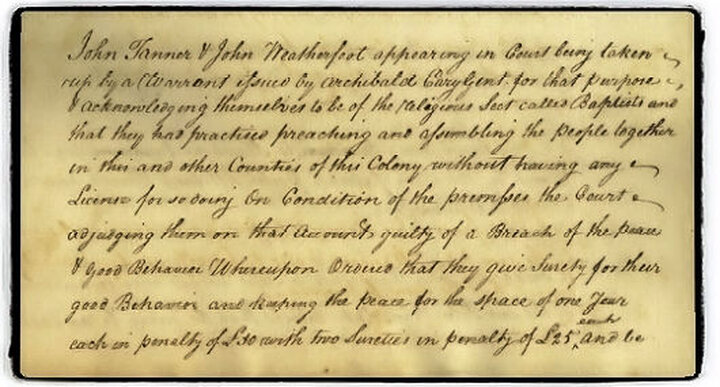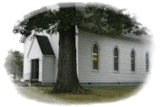Preachers Trial
Revolutionary War in Chesterfield County, Virginia
The Revolutionary War in Chesterfield County, VA
Reverend John Weatherford-Jailed Baptist: A Question of Religious Freedom: The 1773 Baptist Preacher Trial.
Rev. John Weatherford had been some years into his ministry, where he already had a reputation for effective preaching. Close to 70-80 years he preached to a crucified Redeemer and recommended Him to the lost and guilty. “Wherever he went crowds attended his ministry. It was a source of wonder that a plain man without any pretensions to learning should so far obtain the confidence of the people”. (R. H. Winfree, quoted in Lewis P. Little, Imprisoned Preachers, and Religious Liberty in Virginia (Lynchburg VA: J. P. Bell and Co., 1938), 339) In Chesterfield County, Colonel Archibald Carey and the Reverend John Weatherford were two characters in Chesterfield history that clearly stand out in Colonial Times. Both were British Subjects. Col. Carey was the Chesterfield County Sheriff where there are recorded more individual instances of arrests of Baptists for preaching without licenses than in any other Virginia county. Colonel Cary was a military officer, a delegate to the General Assembly, a large property owner and quite influential in the county.Because of his military title, he was determined to establish discipline and to carry out his duty in the matter of these prisoners. Before any kind of religious liberty was even conceived in the American colonies, he might have been doing it for religious reasons as well, but whatever he chose to think, he was right, and all others were wrong in this matter. He was determined to make a point. He arrested John Weather and John Tanner for preaching without proper authority. He was not a Baptist, and his reasoning may have been tainted.
Pictured below is a section of the 1773 Order Book 5, pages 280 & 281. Thanks to Jill A Balsamo, Land Records Supervisor, Chesterfield Circuit Court Clerk's Office for researching and providing the record. Patrick Henry helped to release him from jail and he eventually left Chesterfield. See the Preacher's Trial Re-enactment
A painting of John Weatherford - the Prisoner by Sydney King (deceased) hangs in the Chesterfield museum, Chesterfield County, VA.
The Baptist Trial
The Baptists who first appeared in North Carolina and Virginia were viewed by men in power as beneath their notice; "None", said they, "but the weak and wicked join them; let them alone, they will soon fall out among themselves and come to nothing." In some places this maxim was adhered to, and persecution, in a legal shape, was never seen.
But in many places, alarmed by the rapid increase of the Baptists, the men in power strained every penal law in the Virginia code to obtain ways and means to put down these disturbers of the peace, as they were now called. It seems by no means certain that any law in force- in Virginia authorized the imprisonment of When the Baptists first appeared in North Carolina and Virginia they were viewed by men in power as beneath their notice; "None", said they, "but the weak and wicked join them; let them  alone, they will soon fall out among themselves and come to nothing." In some places this maxim was adhered to, and persecution, in a legal shape, was never seen. But in many places, alarmed by the rapid increase of the Baptists, the men in power strained every penal law in the Virginia code to obtain ways and means to put down these disturbers of the peace, as they were now called. It seems by no means certain that any law in force- in Virginia authorized the imprisonment of any person for preaching. The law was for the preservation of peace. any person for preaching. The law was for the preservation of peace. In 1773-74 there had been a new shower, with Baptists meeting unauthorized in homes, preaching without a license, and disporting themselves evangelistic in a way that gave pain to the old order in church and state. There were persecutions, arrests, imprisonments. James Madison, the son of a chief squire of the region, had argued and agitated as he wrote to his friend "Billeyn Bradford - against this noxious persecution. Legend has it that he actually heard one of the Baptists, continuing his preaching squelched, from the jail. So, Madison had his youthful theoretically position confirmed by experience. In contrast to the other chief participants in the great events that were to come, James Madison was first moved to revolutionary ardor.
alone, they will soon fall out among themselves and come to nothing." In some places this maxim was adhered to, and persecution, in a legal shape, was never seen. But in many places, alarmed by the rapid increase of the Baptists, the men in power strained every penal law in the Virginia code to obtain ways and means to put down these disturbers of the peace, as they were now called. It seems by no means certain that any law in force- in Virginia authorized the imprisonment of any person for preaching. The law was for the preservation of peace. any person for preaching. The law was for the preservation of peace. In 1773-74 there had been a new shower, with Baptists meeting unauthorized in homes, preaching without a license, and disporting themselves evangelistic in a way that gave pain to the old order in church and state. There were persecutions, arrests, imprisonments. James Madison, the son of a chief squire of the region, had argued and agitated as he wrote to his friend "Billeyn Bradford - against this noxious persecution. Legend has it that he actually heard one of the Baptists, continuing his preaching squelched, from the jail. So, Madison had his youthful theoretically position confirmed by experience. In contrast to the other chief participants in the great events that were to come, James Madison was first moved to revolutionary ardor.
 alone, they will soon fall out among themselves and come to nothing." In some places this maxim was adhered to, and persecution, in a legal shape, was never seen. But in many places, alarmed by the rapid increase of the Baptists, the men in power strained every penal law in the Virginia code to obtain ways and means to put down these disturbers of the peace, as they were now called. It seems by no means certain that any law in force- in Virginia authorized the imprisonment of any person for preaching. The law was for the preservation of peace. any person for preaching. The law was for the preservation of peace. In 1773-74 there had been a new shower, with Baptists meeting unauthorized in homes, preaching without a license, and disporting themselves evangelistic in a way that gave pain to the old order in church and state. There were persecutions, arrests, imprisonments. James Madison, the son of a chief squire of the region, had argued and agitated as he wrote to his friend "Billeyn Bradford - against this noxious persecution. Legend has it that he actually heard one of the Baptists, continuing his preaching squelched, from the jail. So, Madison had his youthful theoretically position confirmed by experience. In contrast to the other chief participants in the great events that were to come, James Madison was first moved to revolutionary ardor.
alone, they will soon fall out among themselves and come to nothing." In some places this maxim was adhered to, and persecution, in a legal shape, was never seen. But in many places, alarmed by the rapid increase of the Baptists, the men in power strained every penal law in the Virginia code to obtain ways and means to put down these disturbers of the peace, as they were now called. It seems by no means certain that any law in force- in Virginia authorized the imprisonment of any person for preaching. The law was for the preservation of peace. any person for preaching. The law was for the preservation of peace. In 1773-74 there had been a new shower, with Baptists meeting unauthorized in homes, preaching without a license, and disporting themselves evangelistic in a way that gave pain to the old order in church and state. There were persecutions, arrests, imprisonments. James Madison, the son of a chief squire of the region, had argued and agitated as he wrote to his friend "Billeyn Bradford - against this noxious persecution. Legend has it that he actually heard one of the Baptists, continuing his preaching squelched, from the jail. So, Madison had his youthful theoretically position confirmed by experience. In contrast to the other chief participants in the great events that were to come, James Madison was first moved to revolutionary ardor.In the Chesterfield jail, seven preachers were confined for preaching: John Tanner, William Webber, Joseph Anthony, Augustine Eastin, John Weatherford, Jeremiah Walker and David Tinsley. Some were whipped by individuals and several fined. They kept up their persecution after other counties had laid it aside. John Weatherford and John Tanner were apprehended in Chesterfield County on May 15, 1773, by virtue of a warrant issued by Col. Archibald Cary. When the Court convened nearly three weeks later both John Tanner and John Weatherford were present, and were tried before seven Gentlemen Justices" on June 4, 1773, Chesterfield Courthouse (1749) Trial. See the court order above for a larger view.
